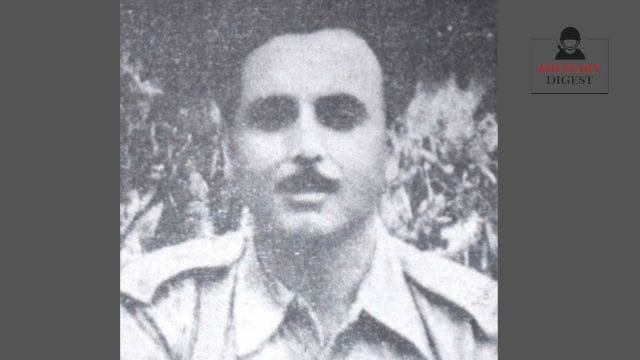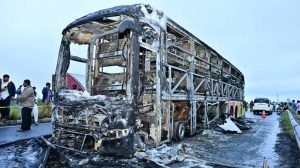Military Digest | Infantry Day: remembering Lt Col Dewan Ranjit Rai, Maha Vir Chakra, killed in battle in Kashmir
Surprisingly for an important figure in the realm of Indian military history--he led the first Indian troops in Kashmir--very little is known about Lt Col Dewan Ranjit Rai.
 Lt Colonel Dewan Ranjit Rai
Lt Colonel Dewan Ranjit Rai On the occasion of Infantry Day, marking the arrival of first Indian troops in Jammu and Kashmir in October 27, 1947, it is fitting that the memories of the commanding officer of the first battalion that landed at Srinagar, Lt Col Dewan Ranjit Rai of 1 Sikh, are refreshed and that the sacrifice he and his gallant troops made in the defence of the Srinagar airfield are never forgotten.
Surprisingly for an important figure in the realm of Indian military history, very little is known about Lt Col Dewan Ranjit Rai other than some basic, frittered information about his military career and personal life. No attempt has been made to research his life and put all the facts together in a cogent form, despite his being the first senior officer of newly Independent India to have died in battle and who received the first-ever Maha Vir Chakra, the nation’s second highest gallantry award.
Lt Colonel Rai was born on February 6, 1913, in Gujranwala in Punjab, now in Pakistan, and went to Bishop Cotton School in Shimla. General P N Thapar, his maternal uncle, was the chief of Army staff. He showed an inclination towards the Army, and when the Indian Military Academy was established in October 1932, he was among the first cadets who joined.
Among his course mates were S H F J Manekshaw, who rose to become the Army chief; and a field marshal, Kanhayya Lal Atal, who too received a Maha Vir Chakra in the 1947-48 war with Pakistan in Zojila while commanding a brigade and later died in an accident; and Nripendra Singh Bhagat, elder brother of Lt Gen Premendera Singh Bhagat, Victoria Cross in Second World War.
Commissioned in February 1935 with IC Number 12, he served a year with the King’s Shropshire Light Infantry, as was the norm for all Indian officers before they went on to serve in Indian regiments. He was allotted the 5th Battalion of the 11th Sikh Regiment a year later and served in various regimental appointments before being appointed as commanding officer of 1 Sikh in the rank of lieutenant colonel. He was earmarked to be posted as a military attache in Washington, US, before fate and events overtook the affairs, and he ended up in Srinagar fighting a battle.
Incidentally, it was not 1 Sikh that was the original choice of the Indian battalion to be dispatched to Srinagar. The first choice was a Gorkha battalion. However, Lord Mountbatten, the viceroy and later the first governor-general of India, decided that the question of the use of Gorkha troops, who were essentially Nepalese citizens, in a conflict without first clearing their use with the Nepalese authorities would not be proper, and hence the nearest available battalion was chosen.
Lt Gen SK Singh (retd), writes in his memoirs that the British commander of the Delhi and East Punjab Command, Lt Gen Dudley Russel, had been mightily impressed with Lt Col Dewan Ranjit Rai during a visit to his battalion, which was deployed in aid to civil authorities due to post-partition rioting around Gurgaon, and hence thought him to be the correct man to lead the first Indian troops in Kashmir.
Moved at short notice and arriving late in the evening of October 26/morning of October 27 at the Palam airfield, the operational order for Lt Col Rai read: “Your battalion less two companies will concentrate Palam airfield by 0400 hours on 27 October. One battery 13 Field Regiment in infantry role being placed under your command. Be prepared to fly on an operational mission ex-Palam morning 27 October. Remainder battalion will be flown 28 October.”
Further instructions were given to Lt Col Rai by then Major S K Sinha, including to secure Srinagar airport and the civil wireless station, drive Pakistani tribesmen away from Srinagar, and aid the local government in the maintenance of law and order in Srinagar.
Supreme self-confidence
Sinha mentions that Lt Col Rai was exceptionally calm as he went about issuing orders to his troops and showed no agitation. Radiating supreme self-confidence, he left the task of making a load table to his second in command and Major Sinha and proceeded to catch whatever little sleep he could before he and his troops departed to Srinagar by air.
Lt Col Rai carried out the operational orders to capture and secure the Srinagar airfield, but realising the fact that the enemy advance must be checked before more Indian troops arrived, he correctly decided to advance to Baramulla to stop the Pakistani raiders from getting any further. He was killed at Pattan, between Srinagar and Baramulla, by a mortar shell while directing battle and organising a fallback to a more secure position.
Very little is known about the personal life of this gallant soldier other than that he had a son and a daughter and that he was an exceptional dancer well acknowledged in Lahore and Shimla. On this Infantry Day, on October 27, let’s spare a thought about Lt Col Dewan Ranjit Rai, Maha Vir Chakra (Posthumous).







